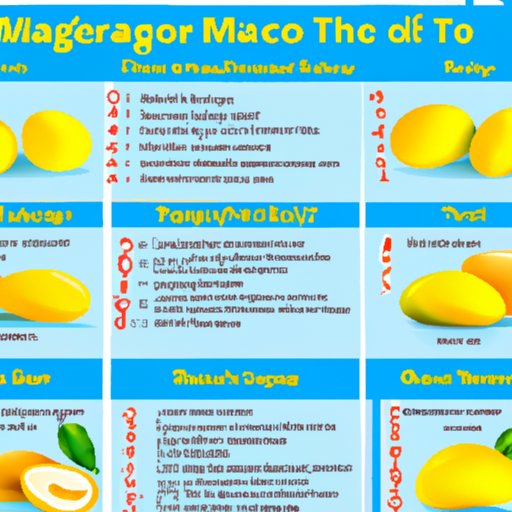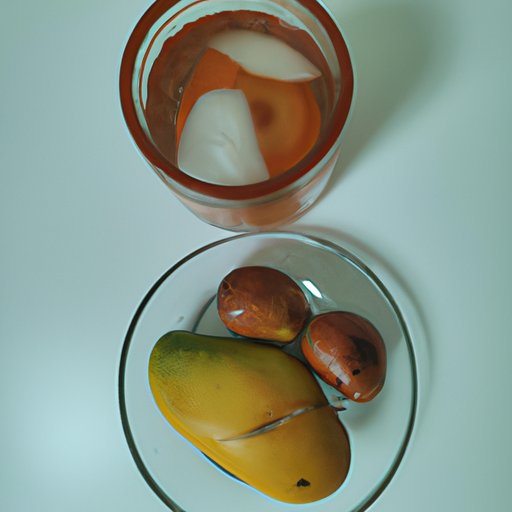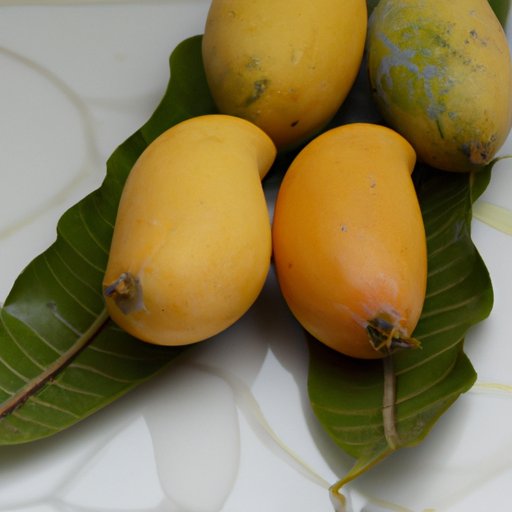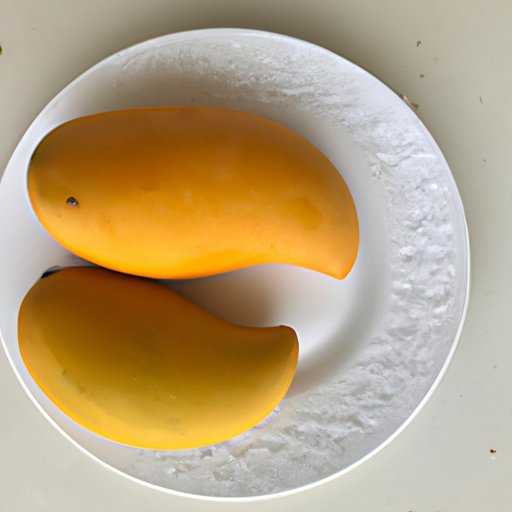Introduction
Diabetes is a chronic condition in which the body has difficulty regulating glucose levels. It can affect people of all ages, but it is most commonly diagnosed in adults. One of the primary ways to control diabetes is through diet and exercise. Eating certain foods, such as mangoes, may help to regulate blood sugar levels and provide other health benefits.
Mangoes are a sweet, juicy fruit that is popular around the world. They are high in fiber, vitamins, and minerals, making them a great addition to any diet. But can diabetics eat mangoes without putting their health at risk? In this article, we’ll explore the answer to that question, as well as how to enjoy mangoes safely as a diabetic.

A Comprehensive Guide to Eating Mango as a Diabetic
Eating mangoes can be beneficial for diabetics, but there are some strategies you should follow to ensure you’re getting the most out of the fruit without putting your health at risk. Here’s a comprehensive guide to selecting, eating, and enjoying mangoes safely as a diabetic.
How to Select the Right Type of Mango
When selecting a mango, look for one that is ripe but still firm. Ripe mangoes will have a slightly soft flesh, with a deep yellow or orange hue. Avoid buying mangoes that are overripe, as they may contain more sugar than you want. Also, make sure to check the label on packaged mangoes to ensure they don’t contain added sugars.
Strategies for Controlling Blood Sugar Levels When Eating Mango
It’s important to monitor your blood sugar levels when eating mangoes to ensure they don’t spike too high. To do this, you should pair the mango with other low-glycemic foods, such as nuts or seeds. You should also limit your portion size to 1/2 cup of mango per meal. Eating too much mango can cause your blood sugar levels to spike.

How to Enjoy Mango Safely as a Diabetic
What to Avoid When Eating Mango
When eating mangoes, you should avoid adding sugar or other sweeteners. You should also avoid eating mangoes with high-fat foods, such as cheese or ice cream, as these can cause your blood sugar levels to spike. Finally, avoid drinking alcohol with mangoes, as this can further increase your risk of developing complications from diabetes.
Tips for Making Mango Part of a Healthy Diet
To make mangoes part of a healthy diet, try to include them in meals or snacks throughout the day. For breakfast, add diced mango to oatmeal or yogurt. For lunch or dinner, top a salad with slices of fresh mango. As a snack, enjoy a small bowl of diced mango with a handful of nuts. By incorporating mangoes into your daily diet, you can get the most out of the fruit’s nutritional benefits.

Healthy Mangoes: What Diabetics Need to Know
Nutritional Value of Mangoes
Mangoes are an excellent source of vitamins and minerals. They are rich in vitamin C, potassium, and beta-carotene, which can help to reduce inflammation and improve eye health. They are also a good source of dietary fiber, which can help to regulate blood sugar levels and keep you feeling full longer.
Different Types of Mangoes and Their Health Benefits
There are many different types of mangoes available, each with its own unique flavor and health benefits. The most popular varieties are Ataulfo, Kent, and Tommy Atkins. Ataulfo mangoes are smaller and sweeter than other varieties, while Kent mangoes have a richer, fuller flavor. Tommy Atkins mangoes are large and tart. All three varieties are excellent sources of vitamins and minerals, making them a great choice for diabetics.
The Risks and Rewards of Eating Mangoes with Diabetes
Potential Complications from Eating Too Much Mango
Eating too much mango can cause your blood sugar levels to spike. It’s important to monitor your levels closely and stick to recommended portions when eating mangoes. If you experience any symptoms of high blood sugar, such as fatigue or blurred vision, seek medical attention immediately.
Benefits from Eating Mango in Moderation
Eating mangoes in moderation can provide numerous health benefits. Not only can they help to regulate blood sugar levels, but they are also a good source of vitamins, minerals, and dietary fiber. Eating mangoes can also help to reduce inflammation and improve eye health. Plus, they’re a delicious way to satisfy a sweet tooth!
Conclusion
Eating mangoes can be beneficial for diabetics if done in moderation. By following the tips outlined in this article, you can enjoy mangoes safely and reap the many health benefits they offer. So go ahead and enjoy this sweet, juicy fruit – just be sure to keep an eye on your blood sugar levels and stick to recommended portions.
In summary, mangoes can be a healthy and delicious addition to any diet, including for diabetics. Just be sure to choose the right type of mango, control your portion size, and avoid adding sugar or high-fat foods. With the right strategy, you can enjoy mangoes safely and get the most out of their nutritional benefits.
(Note: Is this article not meeting your expectations? Do you have knowledge or insights to share? Unlock new opportunities and expand your reach by joining our authors team. Click Registration to join us and share your expertise with our readers.)
